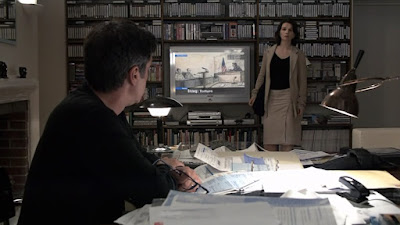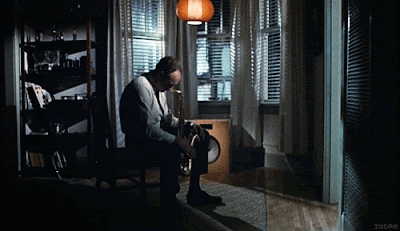Written at the time of the films' American releases. Since then, Bong Joon-ho directed the film Parasite, which won the 2020 Best Picture Oscar, as well as awards for best script and best direction.
"A boy's best friend is his mother."
Mother Yoon (Hye-ja Kim) ekes out a living dispensing naturopathic herbs and running an underground acupuncture practice, all for her backward son Do-joon (Bin Won), 28 and a perfect example of not knowing what he doesn't know. With severe ADD, he has problems with memory retention; the least little thing, shiny or not, will distract him. The phrase "Hold that thought" is lost on him, an impossibility with his sieve-like mind. His type never learns.
You'd think his mother would. Mother Yoon watches her son like a hawk, and though she doesn't approve of him running with "a bad crowd," she can do nothing, or else the boy will storm off and get into some other trouble, or go drinking until all hours, or get beat up. Something...and usually bad. The cops know all about him. He's crossed their paths more than once.
So, when a young girl ends up dead on the night Do-joon goes on a bender, the police arrest him and hold him for trial. And he has no answers for what he was doing that night. This sends Mother into a maternal tizzy, and she works the neighborhood, trying to make nice with the victim's family, obtaining the services of a shady lawyer, but when those avenues prove unrewarding, she begins to investigate the case on her own, pursuing every blind alley and path paved with her Good Intentions.And you know where that leads.One could say that this is a Hitchcockian nightmare with its themes of dangerous Moms and wrong-man incarcerations, but Mother (aka "Madeo"), directed by Bong Joon-ho (who directed the monster hit The Host) hails from Polanski-town,with its themes of obsessiveness, self-delusion and destruction. As played by the internalized Kim, the title character is so wrapped up in her maternal self-sacrifice that that she doesn't see how much she's giving up to save her son. As she digs deeper into the victim's past, she must come to grips with her own, and for all the searching her final destination is her own Soul.Sounds grim, and even a little cruel. Cruel, it is. But, Bong—as he showed with his previous monster movie—has created an intricate little trap of a film, with moments of horror and humor combined, sometimes with their arms so tightly wound each other, they could strangle, whether from love or malice. One senses an ironic glee from the director, who keeps inserting little touches of humor into the proceedings to keep things from getting too heavy, and makes one think that maybe God puts us through such trials, because it's such good sport to see us flail.
_______________________________________________________________________________________
Foreman Raymond Yale (David Roberts in a fine "everyman" performance) is building a resort of "honeymoon suites" for Hubbard Construction in Sydney, Australia. He's getting a bit of side-work in, as well, (or "a bit of mischief" as is the phrase) in an affair with Carla Smith (Claire van der Boom). Both are trapped in loveless marriages: he's just "middle-age-crazy" and her husband (Anthony Hayes) is a low-life criminal. One day she discovers hubby has stashed a bag of cash in the attic—a sizable sum. She decides to tell Ray in an attempt for them to skip out and start anew with a nest-egg. Ray's hesitant. Carla takes that as a sign that an affair is all it's going to be and dumps him.And if everything was going to be fine..that's where the movie would end. Ray can't give up Carla, so they plan their escape and to hide the theft of the loot, they arrange to burn down the Smith's house—the evidence of the switched bag will burn up, and no one will be the wiser.Well, the last part's true, anyway. The Square is a noir deep in the tradition-ditch of such illicit classics as Double Indemnity, The Postman Always Rings Twice, and Body Heat. The perfect plot starts to unravel before it can be set in motion, and soon both Carla and Ray are hip-deep in complications that get worse and worse, and messier and messier—the perfect trial for a relationship. For all the efforts to "make things better," things simply couldn't get worse...until they do. Director Edgerton, who, before he started turning out short films* worked as a stunt-man, always finds the good angles to shoot from, and is more than happy to lead the audience into several very uncomfortable situations that have a gritty realism to them, all to make the audience squirm as much as the characters do, then tops it off with a neat little irony that twists the knife. Like his protagonists, this director might be too clever for his own good. It will be interesting to see what he does in the future and whether he'll deepen his material. For now, though, as an exercise in noir, this one is pretty special.
* The Square is preceded by Edgerton's 2007 short Spider, which is a good preparation for how sadistic a film-maker he can be to his audience. The less said the better, but don't be surprised if the film leaves you wary of the director, and tempted to walk out before the feature starts.





























